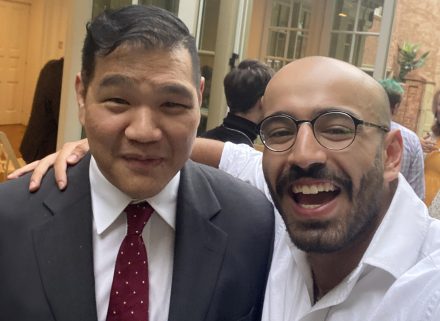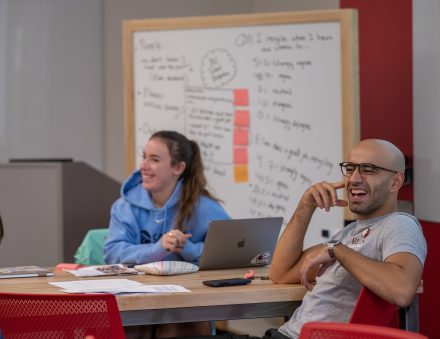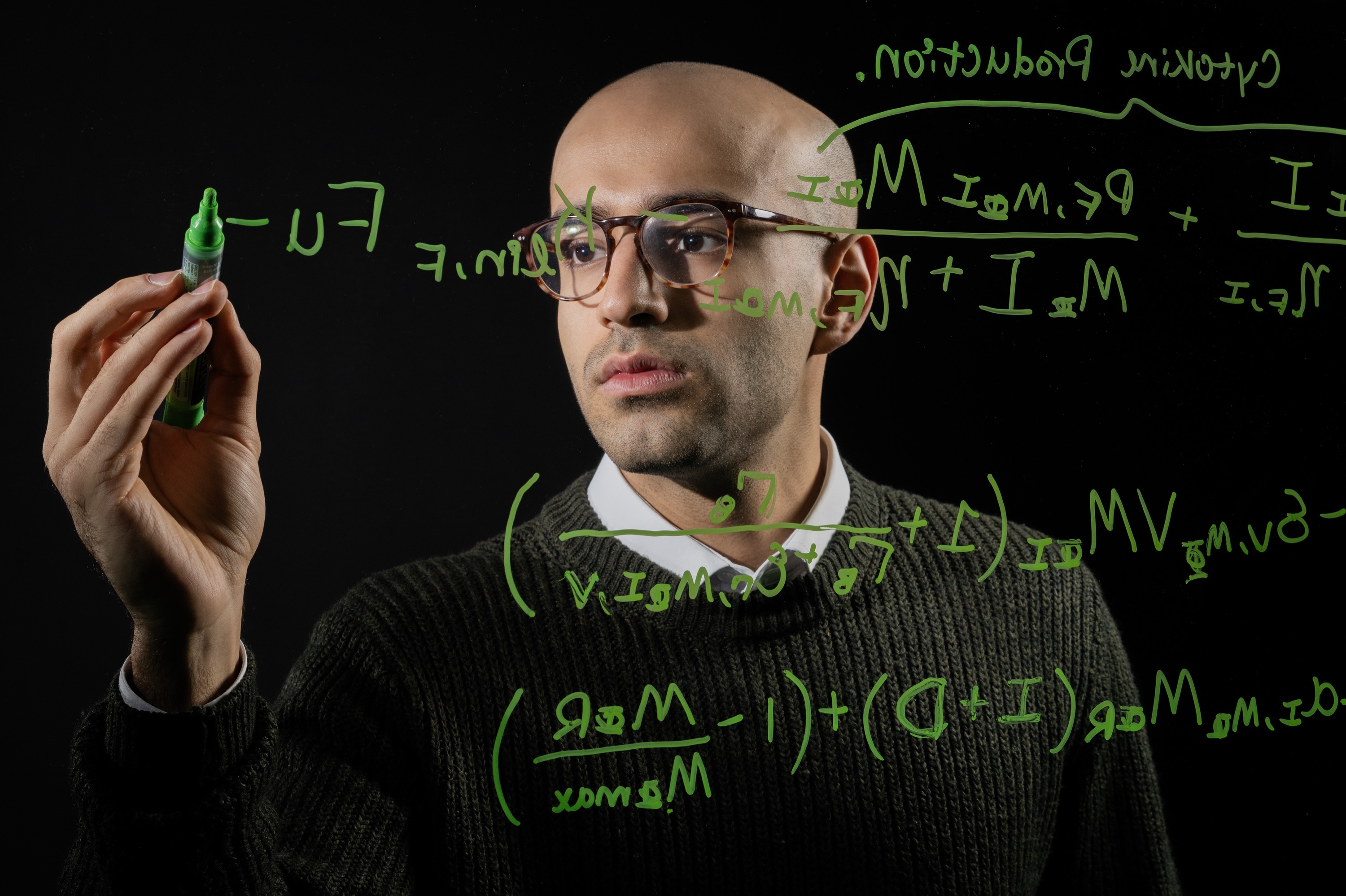How being a Rhodes Scholar finalist has sharpened senior Ayesh Awad’s sense of self
Ayesh Awad ’24 thought he knew himself pretty well when he became an Elon University student in August 2020. He arrived on campus from his native country of Jordan during the thick of the COVID-19 pandemic focused on engineering and intent on conducting research as an undergraduate. It was his first trip to the United States.
As a researcher and a student, he admits to being the one to pepper his professors and mentors with questions, trying to get at what he calls “the whys and the deep parts of doing important things.” But it wasn’t until he undertook the extensive and strenuous application process to become a Rhodes Scholar with the assistance of Elon’s National and International Fellowships Office that he gained a truer understanding of all the different pieces of himself that together make him Ayesh Awad.
Selected as a Rhodes finalist and then narrowly missing selection for the prestigious award, Awad emerged from the process with a clearer picture of how he has grown at Elon and how he can leverage his knowledge, skills and drive to make an impact on lives in the decades ahead. He envisions a career that allows him to use his passion for mathematical modeling to identify and address the root causes of economic disparities around the globe.
“I’m interested in economics, and I’m interested in social justice. I’m interested in people,” Awad says. “Why do poor countries stay poor and why do rich countries stay rich? Is it true that someone can actually climb the social ladder? Mathematical modeling is a perfect way to answer a lot of these questions we have.”
Immersion in research Awad was drawn to Elon through the university’s King Hussein Scholarship, which was established by Queen Noor of Jordan during her 2000 visit to campus and is awarded once every four years to a student from that country. He learned about Elon during a visit by an international student admissions counselor to his high school and chose it because he felt “Elon cared the most about me coming and I felt like I could do the most positive work there.”
Initially, engineering held his interest because the field is centered on solving problems. “I was interested in the thinking part of it,” Awad says. “You have a question, you have a limited amount of information, and you need to use that little bit of information to predict, to find a value, to get something out of it.”
It was during his sophomore year that he first connected with Assistant Professor of Engineering Jonathan Su, who would become his mentor for research supported by the Lumen Prize, Elon’s top undergraduate research award. Awad tapped into Su’s expertise with engineering drug delivery mechanisms with a focus on the mechanical performance of biodegradable stents and was selected as a Lumen Scholar in spring 2022.

Su offered guidance on research methods and expertise within the field of biomedical engineering, and supported Awad’s development outside the lab. “I have had a lot of amazing professors teaching me a lot of wonderful things, but Dr. Su taught me things about life beyond engineering,” Awad says.
For instance, Su purchased Awad a book about career development to coincide with Awad’s trip to a conference that included a career fair.. “He’s not just always helping me in terms of the research,” he says of his mentor. “He’s helping me develop as a researcher, and he’s helping me develop as a person, pushing me forward to achieve the goals that I have.”
Most students pursue one large-scale undergraduate research project, with the Lumen Prize the most prestigious award in support of undergraduate research. But when Awad took a course with Assistant Professor of Mathematics Hwayeon Ryu, he found a passion for mathematical modeling after realizing the power it contained for solving a wide range of problems. As its name suggests, mathematical modeling uses mathematical formulas and equations to describe real-world systems, phenomena or conditions. The goal is to use the models to produce insights leading to solutions. It was Ryu’s differential equations course in spring 2023 that changed Awad’s path at Elon and expanded his focus and horizons as a researcher. “I said to myself, ‘This is it,’” Awad recalls. “I can do a lot of good work here because I have the technical aptitude to do this, and I can apply this to really impact people.”
Even though he was already pursuing research as a Lumen Scholar and had an internship lined up his junior year, Awad doggedly pursued a spot on Ryu’s research team that summer. Ryu received a $300,000 grant from the National Science Foundation in 2022 to develop a mathematical model that could facilitate new COVID-19 treatment options in the future and was leading a team of students engaged in the effort.
Ryu allowed Awad to join the research team, and he soon became a main contributor. More importantly, the experience fueled his interest in mathematical modeling as a powerful tool that can be used to address broader societal issues. “Math is a language,” Awad says. “The strength of math is its ability to actually translate what’s happening in the world into something that is very concrete that you can use to solve or predict things.”
The Rhodes experience Immersed in two intensive undergraduate research experiences, Awad began looking ahead to opportunities after he graduated with the assistance of the National and International Fellowships Office led by Professor Ann Cahill, its director, and Assistant Director Nicole Galante. With a strong academic record and a wealth of diverse experiences as a researcher, Awad was well-positioned to apply for a variety of post-graduate opportunities.
“The application process was actually enlightening. It helped me reflect on who I am as a person, who I am as a scholar, how I came to this point in my life.”
Cahill recognized that with his résumé and future goals, Awad could be a good candidate for the Rhodes Scholarship. Awad committed to the intense process. Along with the main application, he had to gather six recommendations (four academic and two character-focused), a personal statement, an academic statement and more. “I have never worked harder toward something,” he says. “I don’t think I’ve ever wanted to do something or achieve something as much as I wanted the Rhodes.”
Awad approached the challenge by taking a deeper dive into who he was, what he wanted to achieve and into the arc of his personal story. “The application process was actually enlightening. It helped me reflect on who I am as a person, who I am as a scholar, how I came to this point in my life,” Awad says. “When I submitted it, I thought, regardless of the outcome, I did a great thing.”
Awad worked closely with Cahill throughout the application process, except for on his personal statement, which Awad was required to complete without assistance. He credits that support with helping him successfully navigate any challenges while also better understand himself. Cahill says Awad’s energy, work ethic and enthusiasm throughout the process was palpable. “Ayesh embodies the values of the Rhodes Trust exceedingly well,” Cahill says. “Not only does he have an unimpeachable record of academic excellence, but he is motivated by a long-standing desire to foster strong cross-cultural relationships and, more importantly, to improve the lives of his fellow Jordanians.”
Awad says he is not the type of person who takes advice easily, but working closely with Cahill was an incredible experience. “She has a very strong influence on people, just in the way she speaks and the advice she gives,” Awad says. “She’s able to offer guidance and criticism in a way that makes you feel supported and helps you push forward.”
In October, word came that Awad had been selected as a finalist for the Rhodes. As a Jordanian citizen, he applied for the Rhodes within a cohort of countries in the Middle East, and traveled back to his home country that month for two days of networking and interviews that are part of the final selection process. The final decision drew from his participation in a social engagement with other finalists and the selection committee on the first day followed by a 30-minute interview the following day.

Awad was impressed when he first met his fellow finalists, whose areas of interest were broad and deep. “I looked around and realized that I’m in the company of probably one of the smartest groups of people I’ve ever met in my life,” Awad says. “I just enjoyed being there because I felt like we could all be great friends together because we’re bright in a lot of different areas.”
The next day’s interview focused on getting to know him more as a person, going beyond his academic interests and accomplishments. He got the sense the interviewers were impressed by his academic accolades, but perhaps were looking for a candidate with a broader array of experiences. He learned he was not selected for the scholarship the same day but was still encouraged to apply to the University of Oxford.
Cahill is confident Awad will use what he learned from this process to position himself to have an even greater impact in the future. “Being named a finalist in the Rhodes Scholar selection process, one of the most competitive fellowships in the world, is surely only the first of many honors that Ayesh will receive,” Cahill says.
Missing out on the Rhodes was a big disappointment for Awad, but the process provided an opportunity to learn more about who he is and where he sees himself in the future. Looking ahead, he’s seeking an experience that similarly puts him in the company of people who challenge him and whose collaborations help him improve himself. “I can’t wait to go be part of a great institution, a great company, a great team,” he says.



